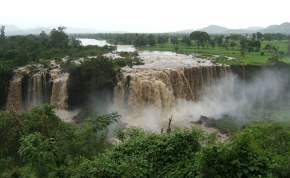Voice of America (Washington, DC)
Egypt, Ethiopia Square Off Over New Nile River Dam
By David Arnold, 20 June 2013
Photo: Giustino
Blue Nile Falls (file photo).
Egypt and Ethiopia are doing their best to lower tensions after weeks of increasingly heated rhetoric over a giant Ethiopian dam project that Cairo believes will reduce the flow of water in the Nile River.The foreign ministers of the two countries met at the beginning of the week in Addis Ababa and agreed to hold further talks and review the recommendations from a panel of experts on what's being called the Grand Ethiopian Renaissance Dam, or GERD.
Construction on the dam started two years ago on Ethiopia's Abbai, or Blue Nile, river, whose basin accounts for about 75 percent of the water flowing into the lower Nile River. The project is about 20 percent complete and Egyptian officials worry that when it's finished in 2017, it will severely reduce the flow of water through the lower Nile channel and turn the arable parts of their country back into a desert.
A day after Egyptian President Mohammed Morsi visited Addis Ababa earlier this month, Ethiopia diverted the Abbai River's flow temporarily to carry out the next stage of dam construction. Even though the water diversion was a brief, news of the interruption touched off a furor in Cairo.
Morsi said Egypt would not tolerate losing "one drop" of Nile water and made thinly veiled threats of military action by saying "all options are open."
The Ethiopians, apparently, were not intimidated.
"I don't think they will take that option unless they go mad," said Ethiopia's president, Haile Mariam Desalegn. The foreign ministry in Addis Ababa said construction on the dam would not stop "for a second."
An expensive project
The GERD project includes a 170-meter high concrete dam and a 6,000-megawatt hydroelectric power plant and will make Ethiopia one of Africa's top electrical energy producing nations when it is completed. Its total cost is estimated at between $4.2 billion and $5 billion.
Ethiopia has said all along that once completed, the dam would not reduce Egypt's water resources, but Egypt wants proof. It also wants assurances that Ethiopia will not use the Abbai waters to irrigate Ethiopian farmlands.
Egypt is also concerned about additional problems as Ethiopia begins filling a massive water reservoir twice the size of the country's largest lake.
"Ethiopia is always saying 'no impact'," said Mahmoud Abu-Zeid, who was Egypt's minister of water and irrigation for 12 years and is now president of the Arab Water Council.
But Abu-Zeid cited studies predicting that during the three to five years it will take to fill the reservoir behind the dam, "there would be a reduction of 14 billion instead of the regular 55.5 billion cubic meters.
"It's time to go back to the negotiating table," Abu-Zeid concluded.
Other experts doubt the reduction would be that much. One of them is Paul Block, a civil engineer who has been consulting on Ethiopian water projects for the U.S. Agency for International Development and the World Bank.
During the years it takes to fill the reservoir behind the GERD, Block says the loss of water flow into the Nile could be minimal. It all depends, he explains, on the amount of rainfall in the region.
Voice of America (Washington, DC)
Egypt: Ethiopia, Egypt Meet to Ease Nile Dam Tensions
By Marthe van der Wolf, 18 June 2013ADDIS ABABA — Egypt and Ethiopia are taking steps to defuse tension over Ethiopia's diversion of the Nile River to construct a massive hydroelectric dam.
The ministers of foreign affairs from both countries held talks in Addis Ababa on Monday and Tuesday. At issue: the tensions that rose after Ethiopia began diverting part of the Blue Nile to advance construction the Great Ethiopian Renaissance Dam.
Ethiopian Foreign Minister Tedros Adhanom told reporters in Addis Ababa Tuesday that both nations have agreed to implement recommendations made by an international panel of experts and to hold further talks.
"Both ministers, in a spirit of brotherly relations and mutual understanding, agreed to embark on consultations at the technical and political levels," Adhanom said, "with the participation of the Republic of Sudan, to implement in a speedy manner the International Panel of Experts' recommendations."
The diplomatic language is a far cry from the heated exchanges over the $5 billion dam, which Egypt fears will threaten its vital water supply.
Most Nile river water originates in Ethiopia. However, colonial-era treaties written by Britain gave Egypt as much 87 percent of the Nile's flow.
Egyptian President Mohammed Morsi has gone so far as to warn this month that "all options" were open in terms of his country's response to the dam project.
The high-level talks come after Ethiopia last week became the sixth country to back replacing colonial-era treaties with a new commission to oversee Nile projects. Rwanda, Burundi, Kenya, Tanzania and Uganda have already signed the agreement. Egypt is among several nations that have yet to do so.
Despite the calmer language, Egyptian Foreign Minister Mohammed Kamel Amr says his country need not apologize for some of its politicians who suggested the right course of action may be to sabotage the construction of the dam.
"It's not a matter of regrets or apologies," he said. "Some pronouncements were made in the heat of the moment, or because of their emotions. No regrets were required."
Minister Tedros is expected to travel to Cairo soon to continue talks over the dam's possible impact.
Ethiopian officials argue Egypt can make up any reduction with better water management.
The construction of the dam started two years ago and is about 20 percent done. When completed in 2017, it will transform Ethiopia into Africa's biggest producer of electricity.
No comments:
Post a Comment